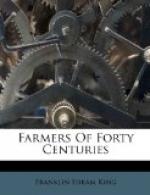The only items which are low compared with our own prices are salted turnips, radishes and eggs. Most of the articles listed were out of season for the locality and were imported for the foreigners, turnips, radishes, pork, fish and eggs being the exceptions. Prof. Ross informs us that he found eggs selling in Shensi at four for one cent of our money.
Our interpreter asked a compensation of one dollar, Mexican, or 43 cents, U. S. currency, per day, he furnishing his own meals. The usual wage for farm labor here was $8.60, per year, with board and lodging. We have referred to the wages paid by missionaries for domestic service. As servants the Chinese are considered efficient, faithful and trustworthy. It was the custom of Mr. and Mrs. League to intrust them with the purse for marketing, feeling that they could be depended upon for the closest bargaining. Commonly, when instructed to procure a certain article, if they found the price one or two cash higher than usual they would select a cheaper substitute. If questioned as to why instructions were not followed the reply would be “Too high, no can afford.”
Mrs. League recited her experience with her cook regarding his use of our kitchen appliances. After fitting the kitchen with a modern range and cooking utensils, and working with him to familiarize him with their use, she was surprised, on going into the kitchen a few days later, to find that the old Chinese stove had been set on the range and the cooking being done with the usual Chinese furniture. When asked why he was not using the stove his reply was “Take too much fire.” Nothing jars on the nerves of these people more than incurring of needless expense, extravagance in any form, or poor judgment in making purchases.
Daily we became more and more impressed by the evidence of the intense and incessant stress imposed by the dense populations of centuries, and how, under it, the laws of heredity have wrought upon the people, affecting constitution, habits and character. Even the cattle and sheep have not escaped its irresistible power. Many times in this province we saw men herding flocks of twenty to thirty sheep along the narrow unfenced pathways winding through the fields, and on the grave lands. The prevailing drought had left very little green to be had from these places and yet sheep were literally brushing their sides against fresh green wheat and barley, never molesting them. Time and again the flocks were stampeded into the grain by an approaching train, but immediately they returned to their places without taking a nibble. The voice of the shepherd and an occasional well aimed lump of earth only being required to bring them back to their uninviting pastures.




